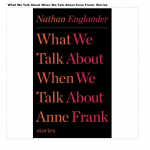 For many Jews, the world is and remains a fragile place. Israel is surrounded by enemies, many of whom have vowed her destruction. Intermarriage and secular life have diminished traditional Jewish culture. The Holocaust survivors are dying of old age, and the sense of righteousness their story conveys is in danger of dying with them. The growth of Arab and Haredi populations threatens what many Jews – American and Israeli – think of as Israel’s identity as a modern, secular state.
For many Jews, the world is and remains a fragile place. Israel is surrounded by enemies, many of whom have vowed her destruction. Intermarriage and secular life have diminished traditional Jewish culture. The Holocaust survivors are dying of old age, and the sense of righteousness their story conveys is in danger of dying with them. The growth of Arab and Haredi populations threatens what many Jews – American and Israeli – think of as Israel’s identity as a modern, secular state.
This uncertainty raises many questions for Nathan Englander, such as: might it ever acceptable for Holocaust survivors to use vigilante justice? Have Jews learned to organize resistance when they need to? What does Jewish guilt mean in a place where a peep show costs $1? What does society owe someone who lost his entire family, and then had to fight to survive? Englander uses the stories in his accomplished new collection “What We Talk About When We Talk About Anne Frank,” to illuminate these questions and possible answers to them.
In “Sister Hills” two families settle in the austere but beautiful part of the West Bank known during biblical times as Samaria. In the story, the army takes a father, then a son, then another. Settlers take land. A mother takes a daughter. What happens when we make promises we have no intention of keeping? Englander’s answer is a lot of unintended consequences: a family is torn apart, an ancient olive tree is harmed, a country lives with a deeply resentful minority. In its symmetry “Sister Hills” is a near inversion of “The Gift of the Magi,” except that instead of giving, its characters take.
In the title story, recently published also in The New Yorker, two couples, one secular and living in the United States, one Chasidic and living in Israel, reunite in the secular couple’s Florida home. A stilted reunion becomes a jovial discussion ranging from how to manage life with a house full of daughters (Israelis) or one son (the Americans). The couples get high together, and run outside into a Florida rainstorm. Most crucially, the couples play what they call the Anne Frank game, the Righteous Gentile game: who will hide us if the need arises? And before they know it, the day has veered into dangerous marital territory. We read what we need to into the Frank family’s story because, just as we do when we talk about love, what we talk about when we talk about Anne Frank is love, and trust, and life itself.
The other stories in the collection, published today, are similarly thought-provoking. Do you agree? Let us know in the comments.
Have a book you want me to know about? Email me at asbowie@gmail.com. I also blog about metrics – for people who hate numbers – here.
